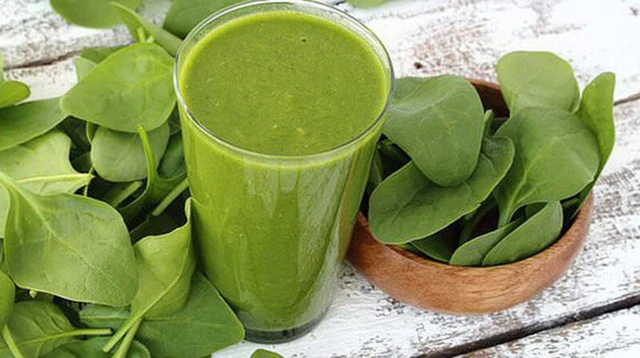Spinach has an impressive nutritional profile, being rich in several protective polyphenols and antioxidant nutrients.
Spinach is a vegetable that can be enjoyed in many ways: raw, steamed, stir-fried or juiced. Spinach is a rich source of nutrients, rich in plant pigments such as chlorophyll and carotenoids.
Drinking spinach juice along with other fruits and vegetables is a popular trend because it provides the body with many essential nutrients without the need for elaborate cooking.
1. Nutritional benefits of spinach

Spinach juice is rich in antioxidants and health-promoting substances.
An 80 g serving (raw) contains:
- 20 kcal/82KJ
- 2.2 g protein
- 0.6 g fat
- 1.3 g carbohydrates
- 2.2 g fiber
- 136 mg calcium
- 1.68 mg iron
- 91 mcg folate
- 21 mg vitamin C
Spinach is rich in lutein and zeaxanthin, carotenoids that help remove free radicals from the body. They are found in spinach and other dark green leafy vegetables. Regular consumption of spinach juice provides the body with enough protein , vitamins and minerals.
Spinach juice is rich in vitamins and nutrients. Just 2 tablespoons of spinach juice (about 30ml) provide the recommended daily amount of vitamin A. In addition to vitamin A, spinach juice also contains zinc, fiber, niacin, vitamins B6 and C, E, K, calcium, magnesium, protein, iron, folate, copper, thiamin, potassium, manganese and phosphorus.
2. Some health benefits of drinking spinach juice
2.1. Spinach juice helps control symptoms related to diabetes
Spinach is an excellent source of antioxidants, especially alpha-lipoic acid which helps increase insulin levels. Diabetics can benefit significantly from spinach juice as this vegetable also reduces the risk of peripheral neuropathy as well as lowers blood sugar levels.
2.2. Spinach juice helps care for eyesight
Spinach contains beta carotene, lutein and zeaxanthin which significantly support eyesight over time. The three components mentioned above all play a role in protecting vision and the development of the macula. The macula helps control the amount of light entering the eye. Overall, the risk of eye degeneration is reduced. Spinach is a rich source of nutrients, rich in plant pigments and carotenoids. In addition to anti-inflammatory effects, these plant compounds are also important for healthy vision, helping to reduce the risk of macular degeneration and cataracts.
2.3. Helps brighten skin and healthier hair
The value of plant compounds in spinach helps the body fight the harmful effects of oxidation. Due to the concentrated antioxidant content in spinach juice, especially the leaves when combined with many other ingredients, helps regenerate cells and keep the skin hydrated.
Healthy skin comes from the body’s natural way of fighting against oxidants. Spinach is rich in vitamin K and folate, which helps prevent and treat acne, fades bruises and dark circles, and brightens the skin. On the other hand, the vitamin A, B, and C content in spinach juice helps stimulate hair growth and improve hair thickness.

Spinach juice helps keep hair and skin healthy by providing plenty of vitamins A, C and iron.
2.4. Helps prevent cancer
Research shows that a diet rich in fruits and vegetables, including green leafy vegetables like spinach, can help reduce the risk of cancer. This is because they contain many plant compounds called polyphenols and are high in vitamins. Cancer comes from many factors, including the carcinogenic effects of heterocyclic amines. These carcinogens come from the charred areas of foods grilled at high temperatures. Over time, this process can cause chronic inflammation and lead to age-related conditions such as heart disease and cancer. Drinking spinach juice contains chlorophyll, which is an effective blocker of amines that can cause abnormalities in cells that can progress to cancer.
2.5. Spinach juice helps increase energy
Spinach has long been considered a vegetable that helps restore energy, increase vitality and improve blood quality. There are good reasons for this, such as its iron content. Iron plays a central role in the function of red blood cells, which help transport oxygen throughout the body, support energy production, and synthesize DNA.
Since spinach juice is rich in vitamins and minerals, it helps the body regenerate and recover quickly even after housework or many activities. The overall balance of the body is maintained thanks to the components in spinach juice such as magnesium and folate.
3. Is spinach juice safe for everyone?
For the most part, this juice is a safe and nutritious option to include in a balanced diet. However, there are some people who should be cautious, as spinach is high in oxalates, so it is not a good choice for people with a history of oxalate kidney stones. If you still want to eat spinach, try to include it in your diet in moderation.
People taking blood-thinning medications, such as warfarin, should also be aware that spinach is a source of vitamin K. It is generally recommended that people taking this medication maintain a roughly constant dietary intake of this vitamin, so consult your doctor before considering drinking spinach juice daily.





